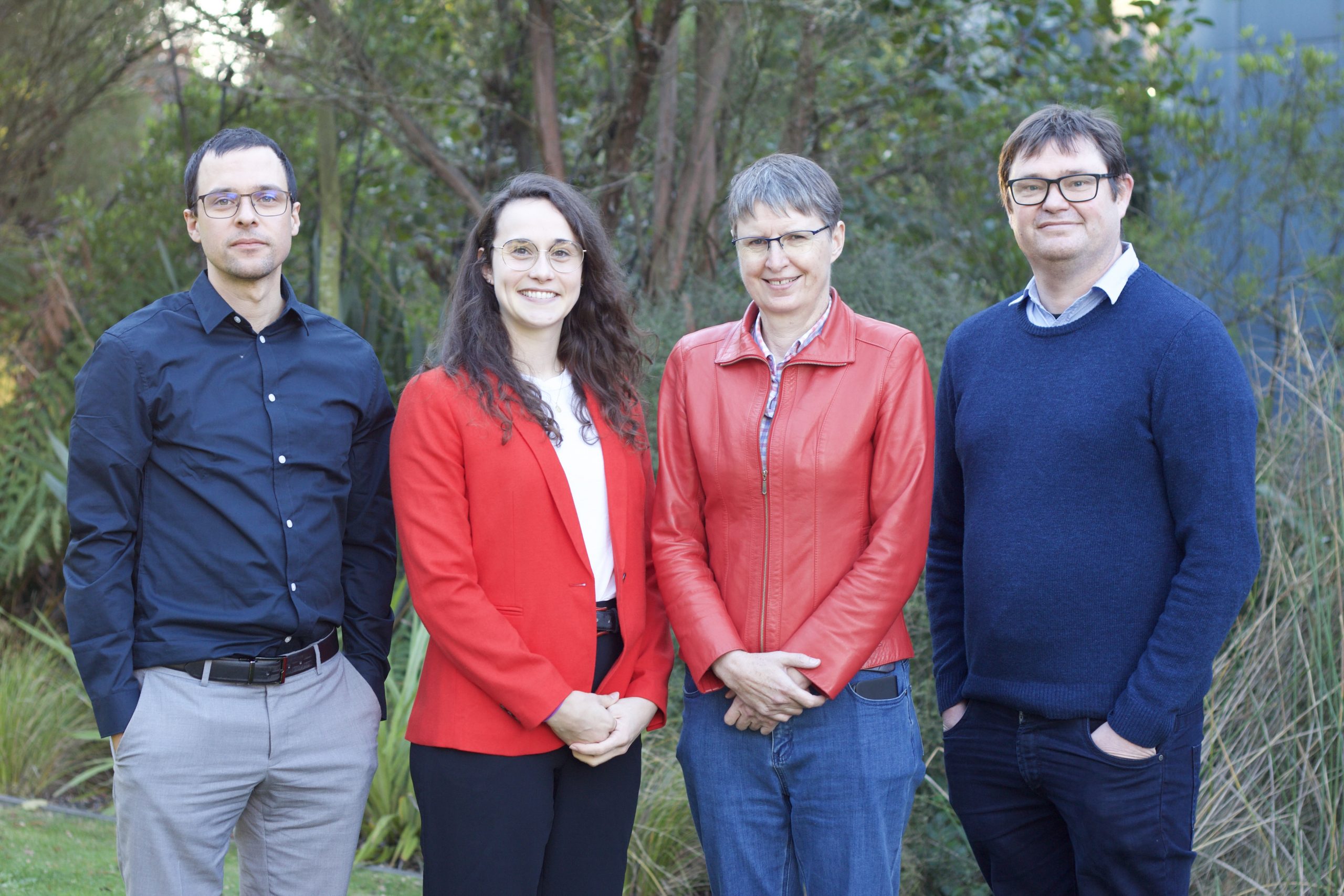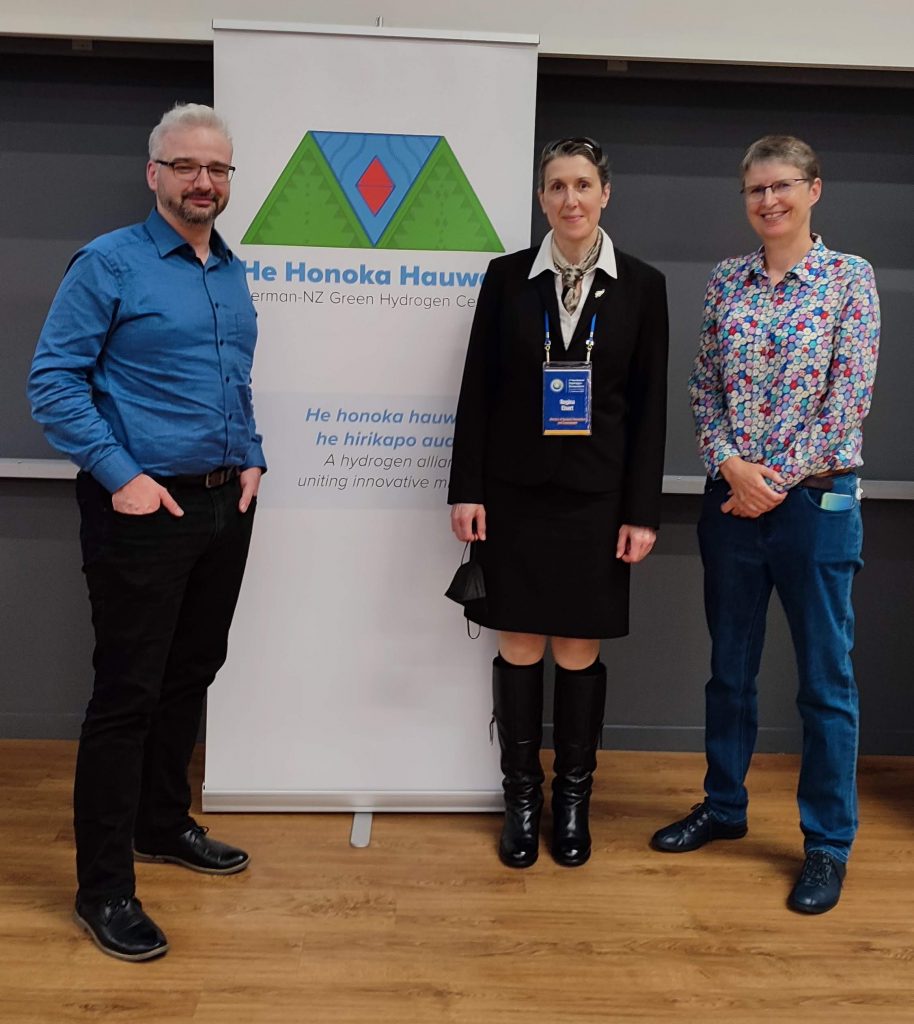Grants
The development of this German-NZ Green Hydrogen alliance and centre / He Honoka Hauwai, is being supported on both the German (BMBF) and NZ (MBIE) sides, with a grant to the co-leaders Prof Sally Brooker (Otago University) and Dr Paul Jerabek (Helmholz Zentrum Hereon) 2021-2026.
The first three German-NZ Green Hydrogen research grants have also been awarded (Minister Verrall press release 16 August 2022; 2022-2025), funded on both the German (BMBF) and NZ (MBIE) sides, including:

Left to right: Jannik and Rebecca, Sally, and Aaron, who lead the 3 German-NZ Green Hydrogen research grants listed below.
-
- “Safe, low cost, hydrogen storage materials from NZ resources” (Hereon press release 4 August 2022; Otago Uni press release 17 August 2022; ODT 17 August 2022; EnergyCentral 17 August 2022) hosted at the University of Otago but with an NZ wide team (A/Profs Nigel Lucas, Anna Garden and Michael Jack of University of Otago; Aimee Kaio of Ngai Tahu; Dr Linda Wright of NZ Hydrogen Council, A/Prof Alex Yip of University of Canterbury, Prof Chris Bumby of Victoria University of Wellington, Prof Peng Cao of University of Auckland, Prof Jonathan Lever of Unitec/Te Pukenga) plus our partners at Helmholtz-Zentrum Hereon (near Hamburg, Germany; Dr Paul Jerabek, Claudio Pistidda, KlausTaube, Julian Jepsen, Thomas Klassen). Co-leaders Prof Sally Brooker (Otago) and Dr Paul Jerabek (Hereon).
- “Investigating ways of producing low-cost green hydrogen” (led by Prof Aaron Marshall), hosted at the University of Canterbury (Canterbury Uni press release 17 August 2022), with NZ (University of Auckland, Victoria University Wellington) and German (Frauenhofer IFAM and University of Bayreuth) partners.
- “Creation of a New Zealand-German platform for green hydrogen integration” (led by Drs Jannik Haas and Rebecca Peer), hosted at the University of Canterbury (Canterbury Uni press release 17 August 2022), with NZ (University of Auckland) and German (DLR) partners.
Other Grants
“Hydrogen generation with sustainable resources – a combined molecular, computational and engineering approach“, a 3 year Marsden-funded project led by Prof Keith C. Gordon (University of Otago) with Prof James Crowley (AI, University of Otago) and researchers from Friedrich Schiller University, Jena (Dr S Kupfer co-PI, Dr GE Shillito and Prof. W Weigand), Ulm University (Prof. D Ziegenbalg) and the University of Nottingham (Prof. MW George).
Abstract: Hydrogen is an important fuel source and commodity chemical used in a wide range of industrial processes. Unfortunately, almost all the hydrogen produced currently is obtained from the steam reforming process which is both energy intensive and generates carbon dioxide as a by-product. There are already several photocatalytic systems, including bimetallic metal complexes that can efficiently generate hydrogen in this way. However, the current technologies use Noble metals which are expensive and rare. They will use earth abundant transition metals such as iron, cobalt and copper by re-designing the photocatalytic systems.
Open Positions
Summer and postgraduate scholarships, postdoc positions, available in green hydrogen
German-New Zealand grant funded positions available in Green Hydrogen:
Masters and Summer Scholarships
Green hydrogen will become a pivotal vector to carry and store renewable energy in a future net-zero carbon New Zealand. These scholarships (please see the details below) are focussed on the development and modelling of green hydrogen storage materials – ranging from metal extraction from minerals, to production, characterisation and hydrogen uptake measurement by the resulting materials, theoretical modelling of the hydrogen uptake, and techno-economic analysis of the roles of hydrogen in New Zealand’s energy system.
He Honoka Hauwai Masters scholarships
Topics
Please see the topic descriptions below. Applicants should indicate the area and primary supervisor they would prefer to work with in their application.
Eligibility
Candidates must be of Māori or Pasifika descent. They need to have a science degree equivalent to the 4-year BSc (Honours) degree, or a postgraduate Diploma in Applied Mathematics, Engineering, Physics or equivalent. Experience in the appropriate research field will be advantageous. Candidates should satisfy the requirements for admission as a research master’s candidate at the University of Otago.
Total value and tenure of the scholarship
The research master’s scholarship will include domestic tuition fees as well as a stipend of $25,000 p.a. (tax-free) for one year.
How to apply
To apply, please send your CV, academic record, and the names and contact details of two referees to: Professor Sally Brooker (sbrooker@chemistry.otago.ac.nz) with “Masters in hydrogen storage materials – subtopic of your choice” in the subject line.
He Honoka Hauwai Summer scholarships
Topics
These are available in the areas listed below, as well as in the development of hydrogen schools outreach activities and undergraduate lab experiments with Dr Dave Warren and Professor Sally Brooker
Eligibility, value and tenure of scholarships
Candidates must be of Māori or Pasifika descent, and be continuing their studies at the University of Otago in 2025, to be eligible for one of these 10 week, summer 2024-2025, scholarships with a tax-free stipend of $8,000.
How to apply
To apply, please send your CV, academic record, and the names and contact details of two referees to: Professor Sally Brooker (sbrooker@chemistry.otago.ac.nz) with “Summer scholarships in hydrogen storage materials – subtopic of your choice” in the subject line.
Topics
MSc in modelling materials for hydrogen storage made from NZ resources
The use of hydrogen as a potential fuel source relies on safe and effective handling and storage. As hydrogen gas is lightweight and difficult to handle, incorporation of the gas into another material can enable facile transport and storage. Metal hydrides are one such form of hydrogen storage, in which hydrogen gas can be reversibly incorporated into the metal lattice. FeTi is one of the most promising materials for this application, which can be synthesized from ilmenite ore, which is abundant in New Zealand sands. However, the as-synthesised FeTi often contains a number of impurities, the presence of which may influence the hydrogen storage capabilities. This MSc project will use computational techniques based on density functional theory to investigate the effect of impurities on the hydrogenation of FeTi, with impurities specifically chosen to reflect the New Zealand ilmenite.
Requirements: A BSc honours degree or equivalent in chemistry, physics or engineering.
Primary supervisor: Associate Professor Anna Garden (Department of Chemistry)
MSc in designing and characterization of hydrogen storage materials from NZ resources
Green hydrogen will become a pivotal vector to carry and store renewable energy in a future net-zero carbon world. FeTi alloys demonstrate high hydrogen uptake at ambient conditions and are a safe and reliable candidate material for bulk hydrogen storage applications such as back-up power systems or micro grids. The mineral ilmenite contains both Fe and Ti and can be sourced in New Zealand, providing an attractive feedstock for preparing FeTi-based storage materials; however, impurities in the alloy can influence the hydrogen storage capabilities. This MSc project will use experimental techniques to prepare and characterise FeTi alloys to better understand the effect of the impurities present in ilmenite on the hydrogen storage capacity.
Requirements: A BSc Honours degree or equivalent in chemistry, physics or engineering.
Primary supervisor: Professor Nigel Lucas (Department of Chemistry)
MSc in designing resilient renewable hydrogen technologies for remote communities
Many remote communities, island nations and end of distribution line customers rely on diesel generators for their electricity supply. Rapidly falling costs for solar PV and battery storage in combination with recent advances in hydrogen electrolyzers, fuel cells and storage technologies have resulted in economically viable renewable alternatives to diesel generators. However, these systems are often not designed to be resilient to extreme weather events, which is particularly important for remote customers. This MSc project will use novel methods based on extreme value statistics to design renewable technology options for a range of remote customer use cases, focusing on resilience to extreme events.
Requirements: A BSc honours degree or equivalent in Engineering, Physics or Applied Mathematics. Programming experience an advantage.
Primary supervisor: Associate Professor Michael Jack (Department of Physics, Energy Management)
Other Scholarships
Click on one of the titles to view the details:
Energy Education Trust NZ Undergraduate/Honours Scholarship
Value: $5,000
Eligibility:
-
- Enrolled or intending to enrol in the third year of undergraduate study or in a fourth year Honours/Postgraduate Diploma programme at one of six NZ Universities during the year of award
- Studying in the fields of science, economics or engineering and demonstrate a strong interest in energy issues and how this interest relates to their study and future career plans
Closing date: 4 April (in 2023)
Application form: https://www.otago.ac.nz/study/scholarships/database/search/otago014645.html
Energy Education Trust NZ Masters Scholarship
Value: $8,000
Eligibility:
-
- Enrolled or intending to enrol in a Masters by thesis or a taught Masters programme with a research component at one of six NZ Universities during the year of award
- studying in the fields of science, economics or engineering and demonstrate a strong interest in energy issues and how this interest relates to their study and future career plans
Closing date: 4 April (in 2023)
Application form: https://www.otago.ac.nz/study/scholarships/database/search/otago824077.html


